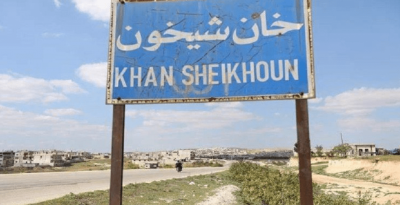Al-Golani’s Defiance of Turkey Leads to Syrian Government Control of Khan Sheikhoun

During the first week of this month of August, the ex-ISIS commander and current head of Hay’at Tahrir al-Sham (formerly known as Jabhat al-Nusra) Abu Mohammad al-Golani held a press conference in the occupied northern city of Idlib. He declared himself unconcerned by the ceasefire established in the course of thirteen meetings between Turkey and Russia at Astana; he said that the Syrian Army was weak and needed a long time to catch its breath, hence no attack was expected soon. He rejected the outcome of the Sochi meeting (stipulating withdrawal to between 12 to 20 km from the demilitarised demarcation line); and finally, he confirmed that his jihadists would not withdraw one single fighter or weapon even if requested to do so by friends (Turkey). A few days later, the Syrian Army launched an attack to liberate northern rural Hama and in particular the city of Khan Shaykhoun and surroundings. The main M5 road goes through Khan Shaykhoun and is therefore included in the demilitarised agreement, signed by Turkey and Russia.
The Astana agreement between Turkey and Russia, with the blessing of Iran and Syria, has also established static Turkish observation positions in Morek, south of Khan Shaykhoun, (now in the current Syrian Army military operational theatre). Turkey is showing uncharacteristic timidity in the way it is contesting the military operation against the al-Golani group and other rebels and jihadists. Sources close to decision makers in Syria said “Turkey was not at all surprised at the operation and its objectives. The Astana agreement is being imposed by fire on those contesting it.”
The Jihadist leader al-Golani was obviously misinformed about the capacities of the Syrian Army; he thought Damascus was on its knees and unprepared for battle. He also miscalculated his own strength when challenging Turkey, supposing that he could simply reject a deal agreed by Ankara and stand against it, unharmed. Refusing to withdraw his jihadists from the demarcation line has now cost him a strategic city, Khan Shaykhoun, together with the anger of the thousands of civilian inhabitants who fled to Idlib. Ankara has lifted its protection of al-Golani to help him realise who is running the show in the north-west of Syria- even if he is in command of thousands of jihadists. Al-Golani’s underestimation of the Syrian Army is costing him a strategic city.

Civilians in Idlib (Syria) burning the photo of al-Golani
Such shifting alliances and reshuffling of friends and enemies are not new to the Middle East, where the art of the impossible is well-practised. Indeed, intelligence officers from Ankara and Damascus continue meetings to talk and keep back-channels open between the two countries. Meetings between Turkish and Syrian officers have taken place in Moscow, Tehran and Kesseb on many occasions and in many circumstances. Syria’s allies Iran and Russia are fostering dialogue between Turkey and Syria whenever possible.
Russia and Iran are allies with Turkey against the US presence in Syria and its hegemony in the Middle East. However, Tehran and Moscow disagree with Ankara’s continuing role in Syria– its occupation of the north-west, and its plans to create a safe zone in the north-east in coordination with the USA.
Turkey doesn’t mind if the jihadist forces of al-Golani, the Turkistani group and al-Qaeda loyalists remain in Idlib and its rural area, along with the pro-American group of Jaish al-Izzah and other rebels under Ankara’s orders. These accommodations have been possible despite the internal struggle for dominance in the occupied northern city. Turkey allows Hay’at Tahrir al-Sham to control the borders and impose taxes on goods and merchandise for its finance and survival. Ankara also doesn’t mind when Russia bombs its allies and friends in Idlib when they attack the Russian base of Hmeymeem and violate the cease-fire agreed in Astana. However, Turkey aims to maintain a tranquil status quo and therefore will not consent to jeopardising its presence in the north-west of Syria if and when the jihadists refuse to abide by its agreement with Russia. Any lack of balance endangering this status quo pushes the Syrian Army to move closer to Idlib, since Damascus is determined to recover all its territory.
On the ground, the Syrian army now controls two thirds of Khan Shaykhoun, and its victory in the city is imminent. The departure of most civilians has exposed the jihadists and demoralised those remaining in the city, and in nearby villages like Latamnah, Kfarzita and Morek.
After many years of war, the Syrian Army has shown itself capable of liberating its territory without military help from Hezbollah, and of taking the military initiative and of moving fast under intense fire against jihadists, who have been occupying and fortifying cities for years (Khan Shaykhoun has been occupied since 2014).
Al-Golani may have forgotten what happened to al-Ghouta (Damascus) when Saudi Arabia and Turkey lifted their protection of thousands of jihadists and rebels, who were then defeated within a short time. In the Syrian quagmire small players like al-Golani cannot dictate terms to the big players.
In Syria, there is Turkey and the US in the north, and Russia, Iran and Damascus in the rest of the country. Turkey has an understanding with Russia and Iran, and another with the US that contradicts the Russian-Iranian goal of liberating all of Syria. All in all, liberating the whole of Syria is a priority- but it may have to wait until after the next US elections, in 2020.
*
Note to readers: please click the share buttons above or below. Forward this article to your email lists. Crosspost on your blog site, internet forums. etc.
All images in this article are from the author

